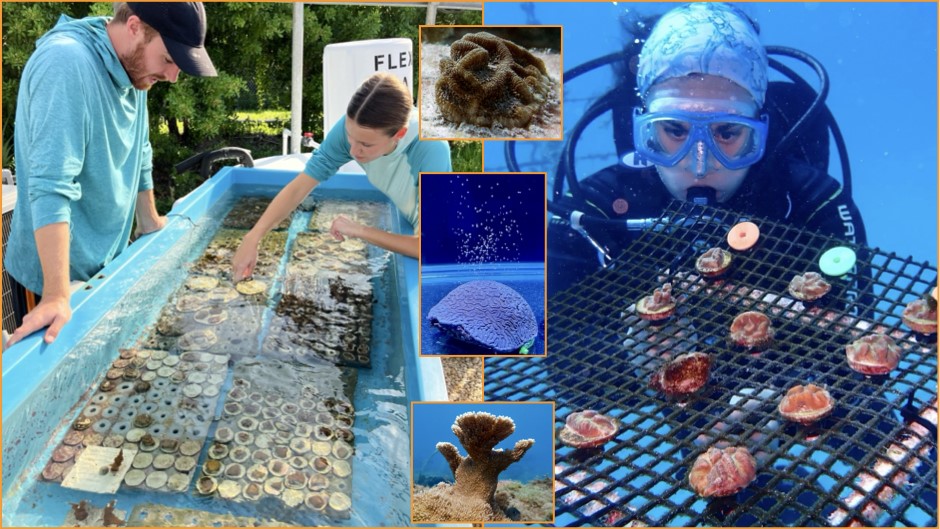By Diana Udel, University of Miami News
Scientists at the University of Miami Rosenstiel School of Marine, Atmospheric, and Earth Science and partners were recently awarded a four-year, $16 million grant from the National Oceanic and Atmospheric Administration (NOAA) Fisheries Habitat Conservation Program Office, to lead an ambitious program to implement and scale-up new approaches to increase the climate resilience of Florida’s restored coral reefs.
The collaborative effort is designed to translate new research into transformative restoration action and will unite the Rosenstiel School with ten other South Florida partners – Mote Marine Laboratory, Nova Southeastern University, The Florida Aquarium, Phillip and Patricia Frost Museum of Science (Frost Science), Smithsonian Marine Station, The Reef Institute, Reef Renewal USA, SECORE International, Biscayne National Park, and AECOM – to form a network that shares new knowledge, resources, and best practices to maximize the ability of newly restored corals to survive climate change impacts.
In response to the unprecedented marine heatwave of 2023, which resulted in record levels of coral bleaching across Florida’s Coral Reef, the team aims to scale up new coral restoration practices to enhance the resilience of these vital marine ecosystems. The project will take place across multiple sites in South Florida, including in Palm Beach, Broward, Miami-Dade and Monroe counties.

“Florida’s Coral Reef is facing one of its greatest challenges yet, and our team is committed to pioneering new approaches to ensure its survival,” said Andrew Baker, the lead of the project and a professor in the Department of Marine Biology and Ecology and director of the Coral Reef Futures Lab at the Rosenstiel School. “With NOAA’s support, we plan to implement groundbreaking approaches that incorporate newly emerging science into restoration efforts designed to enhance coral resilience to increasingly warm oceans”.
The project will integrate novel interventions aimed at increasing heat tolerance in corals, including selective breeding of corals that survived the 2023 bleaching event, the cross breeding of Florida’s endangered elkhorn corals with resilient elkhorns from outside Florida, the conditioning of baby corals to warmer temperatures and their provisioning with heat-adapted algae that help them resist bleaching, and the use of beneficial probiotics to help corals deal with heat stress. By focusing on breeding resilient populations, the project will significantly boost the number of climate-resilient corals introduced into the reef ecosystem each year.
The initiative will also develop and leverage innovative technology developed through previous research, such as new cement materials, hydrogels, and anti-algal coatings, to improve coral recruit survivorship and overall restoration efficacy.
In addition to ecological restoration, the project will also prioritize outreach and training, emphasizing the long-term commitment required for successful coral recovery. Through bilingual community engagement programs at the Frost Science Museum and citizen science initiatives across seven counties, the project aims to foster ocean stewardship and build public support for sustainable coral restoration practices.
The coral reefs of Southeast Florida are facing devastating losses from the combination of climate change, disease, poor water quality, and other factors. These critical ecosystems support valuable commercial and recreational fishing as well as Florida’s tourism industry. According to NOAA, coral reefs in Southeast Florida generate $2 billion in annual revenues and support 70,400 jobs. In addition, Southeast Florida’s reefs play an important role in protecting people and property from the effects of hurricanes, such as flooding and storm surge, along the highly urbanized coastlines of Miami and Fort Lauderdale.
“This collaborative project exemplifies the kind of innovative, community-focused solutions we need to protect Florida’s Coral Reef,” said Baker. “By enhancing coral resilience, this project will contribute to coastal protection efforts in South Florida, highlighting the invaluable role of healthy reefs in safeguarding urban infrastructure from flooding and erosion.”
Banner image: A diver observes coral bleaching in Florida Keys National Marine Sanctuary. (Credit: NOAA’s Atlantic Oceanographic & Meteorological Lab). This piece was originally published at https://news.miami.edu/rosenstiel/stories/2024/11/university-of-miami-partners-awarded-16-million-dollar-noaa-grant-for-groundbreaking-coral-restoration-project.html.
Sign up for The Invading Sea newsletter by visiting here. To support The Invading Sea, click here to make a donation. If you are interested in submitting an opinion piece to The Invading Sea, email Editor Nathan Crabbe at ncrabbe@fau.edu.



